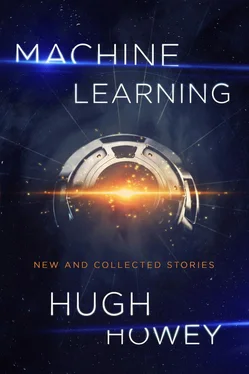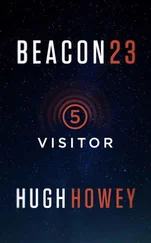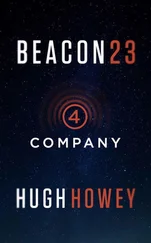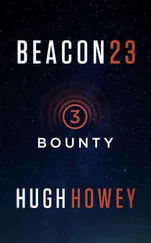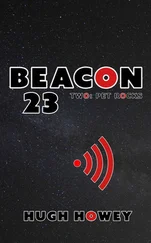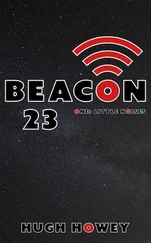“There she is,” Elise said, pointing down by the surf. “You can leave your bags here if you like.”
They elected to carry them. Elise saw them fixate on Juliette, who was standing alone by the surf, watching the tall fishing rods arranged in a line down the beach, monofilament stretching out past the breakers. Farther down the beach, Solo could be seen rigging bait on another line. Charlotte was there as well, casting a heavy sinker into the distance.
Elise had to hurry to catch up with Remy and April. The couple seemed drawn toward Juliette. On a mission. But the woman had that pull on plenty of people. Sensing their presence, the mayor turned and shielded her eyes against the sun, watching the small party approach. Elise thought she saw Juliette stiffen with the sudden awareness that these were strangers, new to the topsides.
“I got a buck,” Elise told Juliette. She nodded toward the couple. “And then I met them in the woods. This is April and Remy. And this is our mayor, Juliette. You can call her Jules.”
Juliette took the couple in. She brushed the sand from her palms and shook each of theirs in turn, then squeezed Elise’s shoulder. A strong wave crashed on the beach and slid up nearly to the line of rods. The tide was coming in. The couple seemed not to be awed by the sight of the ocean, which Elise thought was strange. She still couldn’t get used to it. As for them—they could only stare at Juliette.
“Are you in charge of all this?” April asked.
Juliette glanced down the beach toward Solo and Charlotte for a moment. “If you came from a place with a lot of rules and great concern over who is in charge, you’ll find we’re not so strict here.” Juliette rested her hands on her hips. “You both look hungry and tired. Elise, why don’t you get them fed and freshened up. They can look around camp when they’re ready. And you don’t have to tell us your story until you want—”
“I think we’ll say our piece now,” April said. Elise saw that she was the talkative one now. Remy was holding his tongue. And there was anger in their guises, not relief. Elise had seen this before, the need to vent. She shuffled back a step but wasn’t sure why. Maybe it was because Juliette had done the same.
“Very well—” Juliette started to say.
“We aren’t here to be saved,” April said. She continued to clutch her bag to her chest, like it was a raft keeping her afloat. “We aren’t here to live with you. We died a long time ago, when everything was taken from us. We’ve been dead and walking for years to get here and to tell you this. You didn’t get away with it.”
“I’m not sure I—” Juliette began.
April dropped her bag to the sand. In her hand was a silver gun. Elise knew straightaway what it was. There were three of them in camp that the men used to hunt; Elise hated the way they spooked the wildlife.
This one was different… and trained on Juliette. Elise moved to stand in front of the mayor, but Juliette pushed her away.
“Wait a second,” Juliette said.
“No,” April said. “We’ve waited long enough.”
“You don’t understa—”
But a roar cut off whatever Juliette was about to say. A flash and an explosion of sound. She fell to the beach, a wild wave rushing up nearly to touch her, all so sudden and yet in slow motion. Elise felt her own body startle, like a deer that knows it’s in mortal danger. She sensed the whole world around her. Saw Solo and Charlotte stir down the beach and start running. Felt the heat of the sun on her neck, the tickle of sweat on her scalp. Could feel the sand beneath her feet and hear the crying birds. There was an arrow in her hand, her bow coming off her shoulder, a gun swinging around, a man yelling for someone to stop, Elise wasn’t sure who.
She only got half a draw before the arrow slipped from her fingers. She loosed it before the trigger could be pulled again. And the shaft lodged in the woman’s throat.
More screaming. Gurgling. Blood in the sand. Remy moved to catch his wife. Elise notched another arrow, swift as a hare. By her feet, Juliette did not stir. The man reached for the gun, and Elise put an arrow in his side, hoping not to kill him. He roared and clutched the wound while Elise notched another and knelt by her wounded friend. The man regrouped and went for the gun again, murder in his eyes. For the second time that day, Elise put an arrow through an animal’s heart.
The only people moving on the beach were Solo and Charlotte, running their way. Elise dropped her bow and reached for Juliette, who lay on her side, facing away from Elise. Elise held her friend’s shoulders and rolled her onto her back. Blood was pooled on Juliette’s chest, crimson and spreading. Her lips moved. Elise told her to be strong. She told the strongest person she’d ever known to be extra strong.
Juliette’s eyes opened and focused on Elise. They were wet with tears. One tear pooled and broke free, sliding down the wrinkled corner of Juliette’s eye. Elise held her friend’s hand, could feel Juliette squeezing back.
“It’ll be okay,” Elise said. “Help is coming. It’ll be okay.”
And Juliette did something Elise hadn’t seen her do in the longest time: She smiled. “It already is,” Juliette whispered, blood flecking her lips. “It already is.”
Her eyes drifted shut. And then Elise watched as the furrow in her mayor’s brow smoothed away and the tension in Jules’s clenched jaw relaxed. Something like serenity took hold of the woman. And the demons everywhere—they scattered.
AFTERWORD
It’s brutal on readers when beloved protagonists disappear forever. Most writers won’t even touch the subject. We like to think these characters live eternally, even though we know that’s not true. I’ve never been fond of this avoidance of the inevitable. There’s closure in knowing a character’s full arc. And it doesn’t mean their story is over; there are all sorts of adventures untold to go back and revisit.
When John Joseph Adams and I began brainstorming our Apocalypse Triptych, I decided to tell the conclusion of my most iconic character’s story. It would still leave much to tell: the rescue of the residents of Silo 40; Jules’s trip south to Old Florida; the time she lost the mayoral election by a single vote (hers); and her third and final chance at real love.
As writers, we should trust more in our power to create riveting characters, worlds, and story lines. That means being able to let go of past creations. It means not telling the same stories over and over again (even if themes are repeated throughout our works). Letting go is hard. But it’s the only way to reach out and grab what’s next.
The Free Territory of Colorado, 1868
My path to sickness began the day General Lee surrendered his sword. That coward laid down his arms, and so me and my brother took our rifles and headed west. Wasn’t sure where we was heading, just away. My brother didn’t make it far. He’d survived the Battle of Sharpsburg but was brought down by a persistent cough. Fell off his horse and never got back up. I’d seen more dead than any vicar, but that don’t make me immune to its sad effects. Many a drink and several fistfights later, I found myself in a new army. They gave me a uniform I was more familiar shooting at than buttoning across my chest, and somehow slid from a war between brothers to this frontier life hunting natives. It was all about killing a man you didn’t know. That made it easier, keeping them strangers. Knowing them makes the killing hard.
My father had raised me and my brothers in the pine-studded hills of Virginia, just outside of Staunton. Pa gave me my first rifle, pointed at a squirrel, and told me to shoot. Men more dear to me than my father have been handing me guns and directing my fire ever since. I still find it strange how a man can lose at a war and then enlist in another with his enemy. But there are no real sides in this life except the barrel of a gun and the butt of a gun, and I know where I prefer to stand.
Читать дальше
